
After three election cycles since its debut, Bitcoin has become a key issue in the US election in 2024. As the Bitcoin concept described by Satoshi Nakamoto in the white paper has gradually gained popularity, its supporters have formed a group of voters that cannot be ignored in US politics. This article analyzes the multiple factors behind the increasing importance of Bitcoin and cryptocurrencies in elections, including the erosion of real wages by inflation, the challenge to the global status of the US dollar, the growing interest of American voters in cryptocurrencies, and the current government's regulatory strategy for the crypto industry.
This article was written by the research team of HTX Ventures. The article further explores the different positions of presidential candidates on cryptocurrencies and how these attitudes will shape future policy directions and market expectations. At the same time, the article also discusses the role of prediction markets, especially Polymarket, in elections and possible innovative development directions of prediction markets, as well as how the election will affect the cryptocurrency market in terms of macroeconomic liquidity.
Finally, the article predicts the possible impact of the election results on cryptocurrency companies. If Trump wins, it is expected that there will be a clearer and more relaxed regulatory environment, which will help incubate and grow cryptocurrency startups, and even open up channels for cryptocurrency companies to go public, provide guarantees for the exit of traditional investment institutions, enhance the wealth effect, improve the financing environment, and accelerate DeFi's entry into the mainstream financial market and promote innovation and development in the BTCFi field.
Background on Cryptocurrency Becoming an Important Election Issue
What Bitcoin Means for America
Demand for hedging against inflation strengthens
According to a survey by Forbes magazine, after deducting inflation, the real wage level of Americans has hardly increased significantly since the mid-1980s. After adjusting for inflation, the purchasing power of the average hourly wage in the United States today is almost the same as it was in 1978. This has exacerbated the widening gap between the rich and the poor: the upper class has seen a sharp increase in wealth due to their large holdings of fixed assets, while the wealth of the working class has been shrinking.
Since the financial crisis in 2008, Bitcoin has been increasingly seen as a potential tool to combat inflation and economic uncertainty, especially providing the middle class with hope for economic independence. Bitcoin's decentralization and limited supply make it an alternative asset to government and central bank intervention. Although the U.S. dollar remains the world's reserve currency, as investors' demand for value-preserving assets continues to increase, Bitcoin's appeal is growing and is considered an effective tool to combat inflation, especially for the increasingly pressured working class.
Regardless of whether Trump or Kamala Harris wins the presidential election, U.S. fiscal policy is likely to lead to larger budget deficits. According to the Congressional Budget Office's forecast, the U.S. federal budget deficit will average 6.2% of GDP over the next 10 years. If Trump continues his 2017 tax cuts and further reduces tax rates, the deficit could climb to 7.8% of GDP. In contrast, Harris plans to increase the corporate tax rate to 28%, but her other reform proposals could still bring the deficit to 6.5% of GDP.
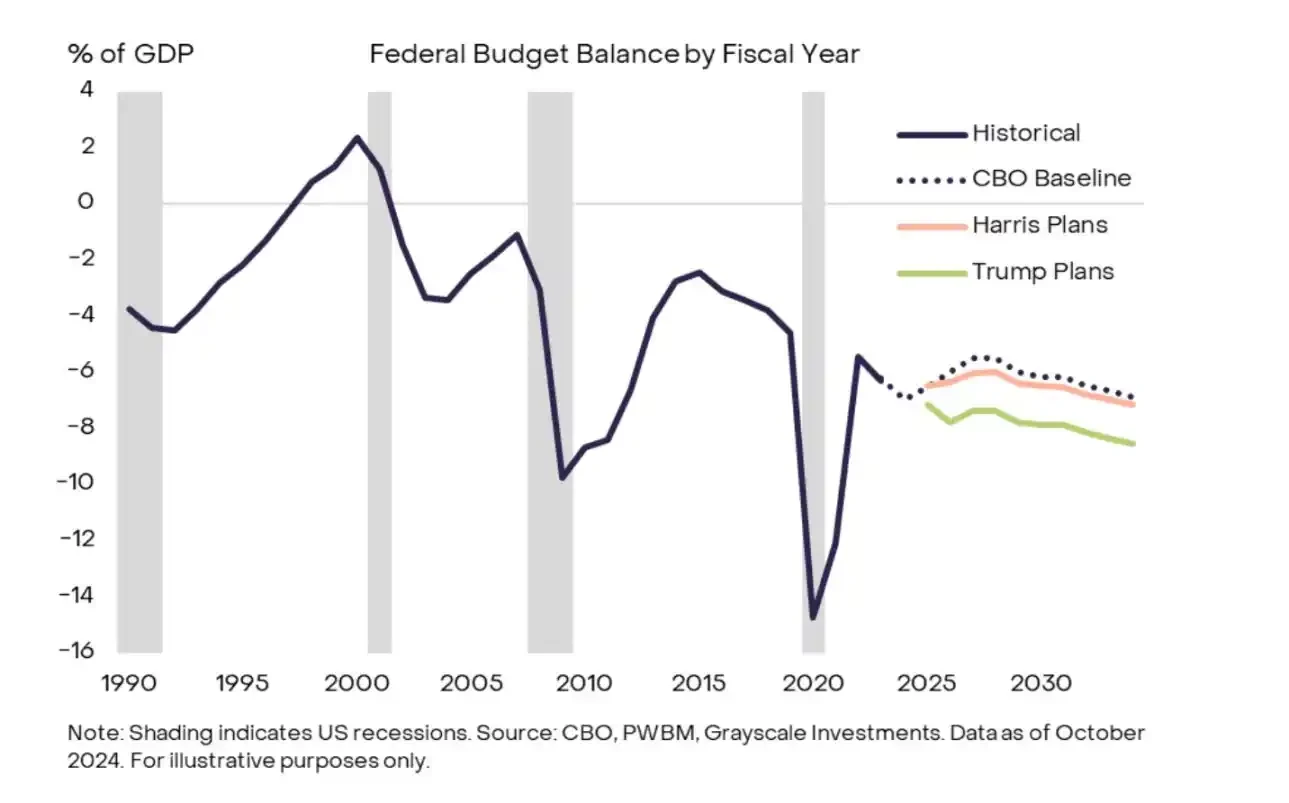
https://www.grayscale.com/elections
Over the past 25 years, the U.S. federal debt has risen sharply from 40% to 100% of GDP, and in the next 10-30 years, this ratio may climb to 124%-200%. The upcoming presidential election may trigger the so-called "Minsky moment", that is, the bond market realizes the seriousness of the debt problem and demands higher returns to compensate for the financing risk. Such a moment may cause the bond market to collapse and trigger a financial crisis.
Both Trump's tax cuts and Harris' tax increase plans are likely to further exacerbate the US deficit and debt burden and increase the risk of financial market turmoil. There are limited ways to solve this high debt, and diluting the debt through inflation may be the only way for the US government to deal with this dilemma. However, the negative impact of inflation will compress the purchasing power of the working class and exacerbate wealth inequality.
It is worth noting that the Bitcoin bill currently awaiting approval by Congress may provide a new solution to the US debt problem. The bill aims to incorporate Bitcoin into the broader financial system, which may help stabilize the US debt structure by attracting a large amount of private and institutional capital, and even bring a certain degree of stability to the global financial system. As a decentralized and scarce asset, Bitcoin can provide governments and investors with a tool to hedge against inflation and avoid risks, especially in dealing with debt and inflationary pressures. It has potential strategic significance.
Strengthening the international influence of the US dollar
As one of the most popular crypto products, stablecoins have become a hot topic in policy discussions, with the U.S. Congress considering a number of related bills. One of the key factors driving this discussion is the recognition that stablecoins can help strengthen the international influence of the U.S. dollar as its global reserve currency status gradually weakens. Currently, more than 99% of stablecoins are denominated in U.S. dollars, far exceeding the second largest denominated currency, the euro, which accounts for only 0.20%. The widespread use of stablecoins has further consolidated the dollar's dominance in the digital asset market, while also providing a new way for the United States to maintain its advantage in the global financial system.
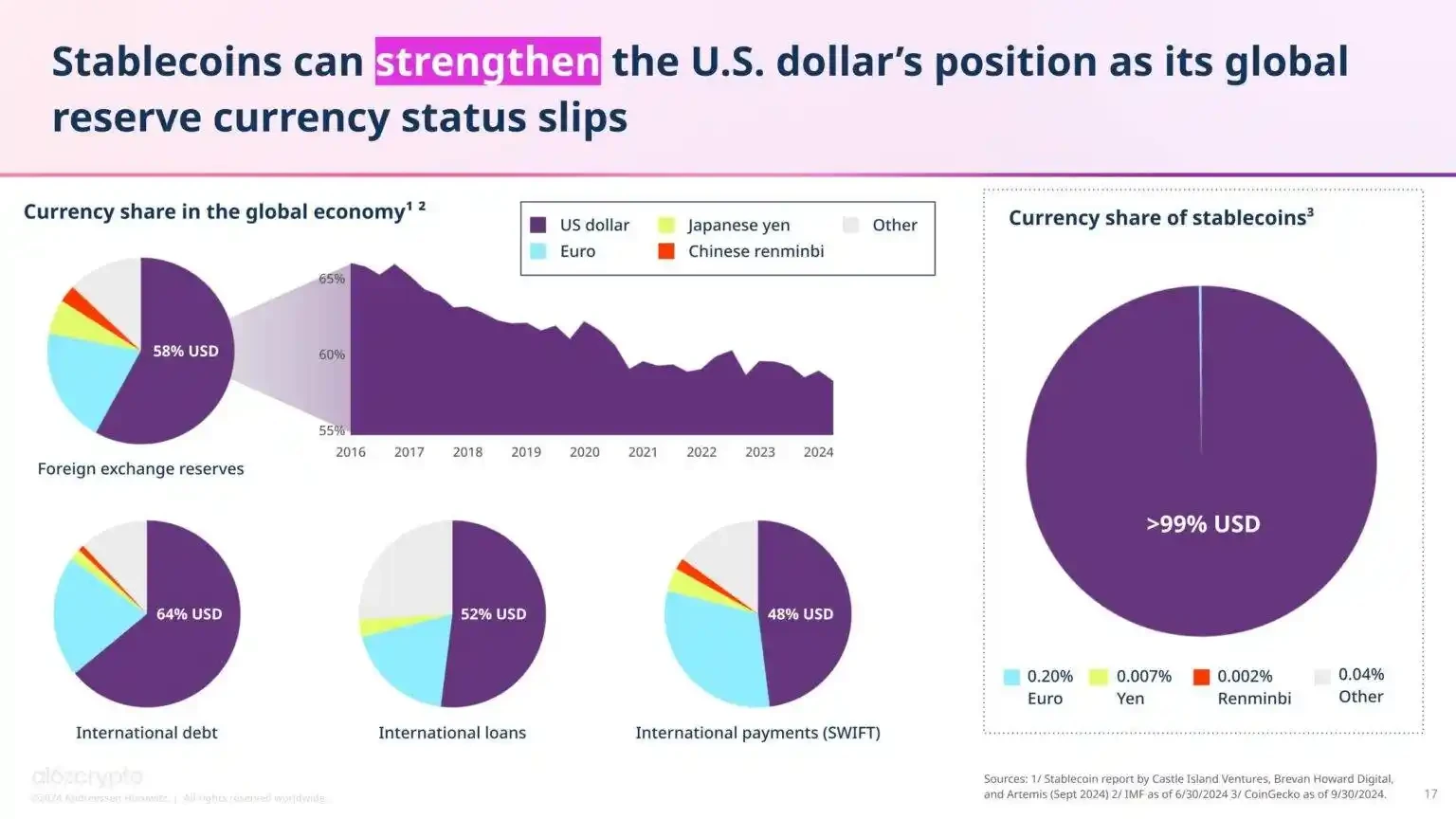
In addition to strengthening the dollar's influence internationally, stablecoins may also further strengthen the United States' financial foundation domestically. Although stablecoins have only been developed for a decade, they have become one of the top 20 holders of U.S. Treasury bonds, surpassing countries such as Germany. This shows that stablecoins not only help to enhance the global dominance of the dollar, but also become an important part of the U.S. financial system by absorbing a large amount of Treasury bonds, providing additional liquidity support to the economy.
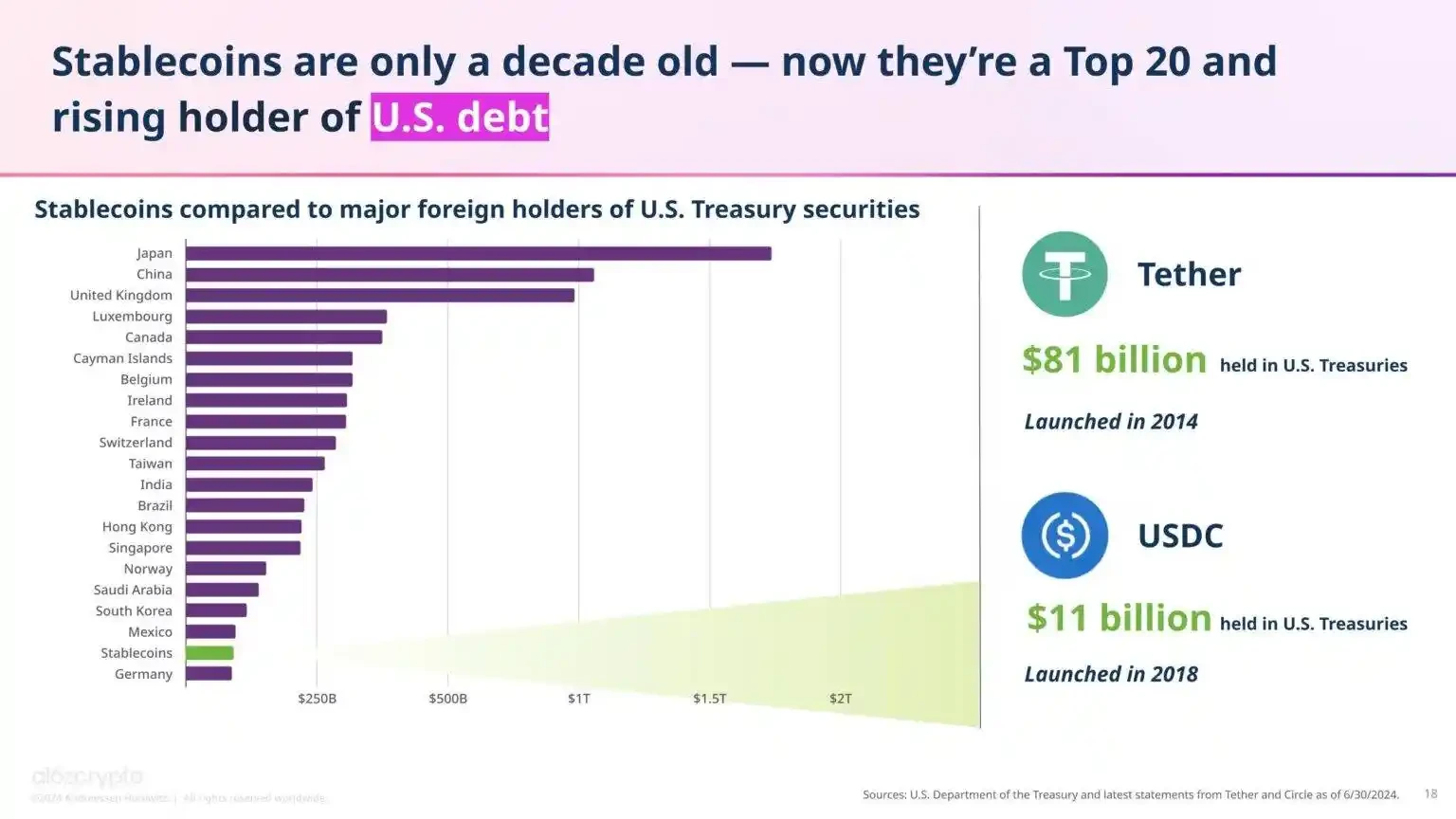
Rising Voter Interest in Crypto
In the Harris Poll, a national survey conducted by Grayscale, about half of potential American voters said they would be more inclined to support a candidate who has a positive attitude toward cryptocurrencies than one who is not interested in cryptocurrencies.
At the same time, voters in swing states have also shown a significant increase in their interest in cryptocurrencies. In Pennsylvania and Wisconsin, two key states that will face fierce competition, Google's cryptocurrency search interest has risen to fourth and fifth place respectively since the 2020 election, while Michigan's cryptocurrency search interest ranks eighth in the United States.
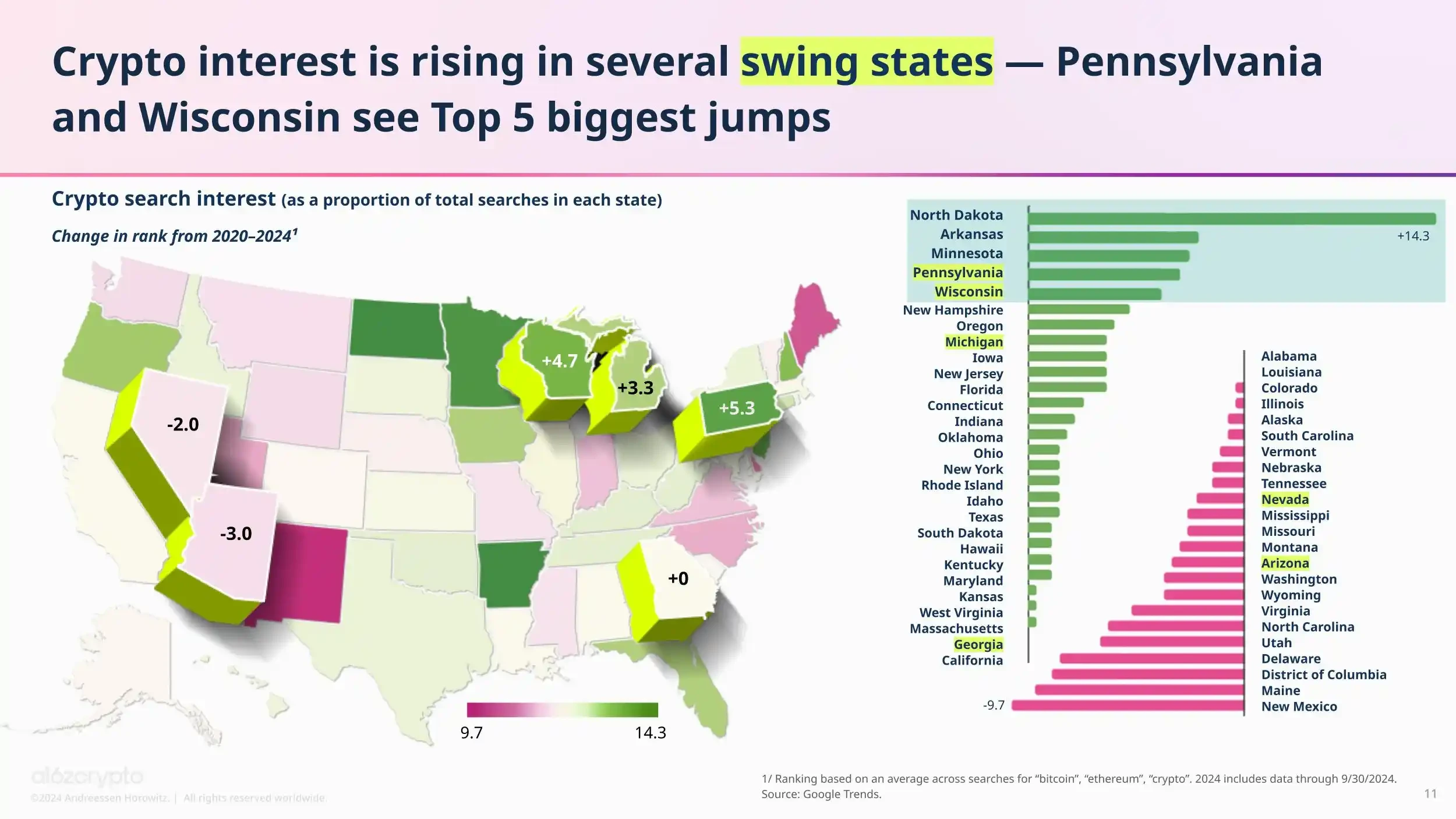
The Biden Administration’s Regulatory Hunt for Crypto Companies
The Biden administration set out to strengthen cryptocurrency regulation early in its term and is committed to establishing a stricter framework, including securities charges against Ripple, strengthening tax reporting requirements for crypto companies and Bitcoin miners, and imposing capital gains taxes. After the collapse of FTX, the government stepped up its efforts to hold large cryptocurrency companies accountable and made a series of legal advances. For example, Zhao Changpeng, the former CEO of Binance, the world's largest cryptocurrency exchange, was sentenced to four months in prison for U.S. and international litigation. Shortly thereafter, the U.S. Securities and Exchange Commission (SEC) filed a lawsuit against Coinbase, accusing it of operating its crypto asset trading platform as an unregistered securities trading platform. If the lawsuit is successful, it will pose a major threat to Coinbase's business model. Other companies accused include crypto exchange Kucoin and others.
Crypto corporate donations play a central role
In 2024, cryptocurrency companies have become one of the main forces of political donations in the United States. Coinbase and Ripple are now the largest corporate political donors this year, accounting for nearly 48% of total corporate donations. The Fairshake Super Political Action Committee (PAC), founded in 2023 and led by former New York Governor's Assistant Josh Vlasto, has raised more than $200 million for candidates supporting cryptocurrency, becoming the PAC with the highest spending in this election cycle. Fairshake's goal is to elect candidates who support crypto and defeat skeptics, and has received support from companies such as Coinbase, Ripple, and Andreessen Horowitz.
These funds not only influence the policies of presidential candidates, but also promote congressional election policies that are favorable to cryptocurrencies. The cryptocurrency industry has thus moved from behind the scenes to the front stage and become an important force in American politics.
A typical case occurred in March of this year, when Democratic radical star Katie Porter raised more than $30 million in the California Senate election and was expected to win. But because she followed Elizabeth Warren's political line and stood with Harris on bank regulation, Fairshake regarded her as an "anti-crypto ally." In the California primary, Fairshake invested more than $10 million to attack Porter, weakening her base among young voters. Through Hollywood banner ads and comments targeting her, Fairshake claimed that Porter misled voters to support the big business bill, causing her campaign funds to be hedged, and eventually fell behind fellow party member Adam Schiff and failed to enter the fall general election.
This phenomenon has led many Democratic candidates to set up special sections on their campaign pages to support cryptocurrencies, sending signals to crypto PACs to gain financial support. Crypto PACs have significantly influenced the candidates' positions.
Impact of the election
Policy proposals of both campaign parties
Harris
Harris's comments on cryptocurrency policy are relatively limited, saying only that she will "encourage innovative technologies such as artificial intelligence and digital assets while protecting consumers and investors." In response to the problem of lower-than-expected support among black male voters, she recently launched a series of economic security plans, including a promise to develop a crypto regulatory framework to protect black men's crypto investments. However, this framework is only aimed at black voters and lacks clear regulatory details or specific policy positions. The crypto community criticized her for lack of sincerity, believing that she is only using cryptocurrency as a tool to win votes.
The current Biden/Harris administration has taken a more confrontational regulatory stance toward the crypto industry, including filing multiple lawsuits, restricting traditional banking services, vetoing bipartisan legislation, and continuing to consider imposing capital gains taxes on cryptocurrencies. Although Harris' crypto policy may be friendlier than Biden's and is expected to improve the industry's regulatory environment, her stance on key issues such as taxation, Bitcoin mining, and self-custody is still more cautious, far less than Trump's pro-crypto stance.
Trump
The Republican Party has always emphasized individual freedom, and its values are somewhat consistent with the decentralized concept of cryptocurrencies. The Republican National Committee mentioned cryptocurrencies in its official platform, saying that Trump will defend the right to mine Bitcoin and "ensure that every American has the right to keep their own digital assets and trade them without government monitoring and interference." In contrast, the Democratic Party tends to strengthen government power and supervision, which has some friction with the cryptocurrency community in terms of concept.
Trump has shown great interest in the digital asset industry, claiming to make the United States the "global capital of cryptocurrency and Bitcoin." He supports Bitcoin mining and promises to protect the right to self-custody. In addition, Trump once used BTC to buy burgers for diners during the campaign, and publicly criticized the U.S. Securities and Exchange Commission (SEC) for its tough stance on cryptocurrencies, saying that if he were to take office again, he would appoint a new crypto-friendly chairman. Trump also launched his own decentralized finance project (DeFi) - World Liberty Financial.
Trump has proposed a series of cryptocurrency policy proposals, including:
● Establishing a Bitcoin Government Reserve: Trump noted that his administration will "retain 100% of all Bitcoin currently held or acquired by the U.S. Government" and that these Bitcoins will form the "core of the National Strategic Bitcoin Reserve." As of October 2023, the U.S. government is estimated to hold over $5 billion worth of Bitcoin, primarily seized through criminal investigations. However, it remains unclear how these reserves will be used, whether they are practical, or even whether they will be widely accepted by the crypto industry.
● Establishment of a Cryptocurrency Advisory Committee: Trump proposed the establishment of a "Presidential Advisory Committee on Bitcoin and Cryptocurrency" in Nashville, and said that the committee will be composed of "people who love this industry" to formulate rules, not "people who hate the crypto industry."
● Preventing the Fed from launching digital currency: Many countries around the world are advancing central bank digital currencies (CBDCs), but this trend has been resisted by the crypto community in the United States. Although the Fed has not yet decided whether to launch a digital dollar, it released a report in January 2022 discussing the potential costs and benefits of CBDCs. Trump has publicly opposed the idea many times, calling it a "significant threat to freedom." In May 2024, the House of Representatives passed a bill prohibiting the Fed from creating a CBDC, but the bill is still a long way from becoming law.
It is important to note that despite Trump’s support for cryptocurrencies, his tariff policy could spark economic uncertainty, and the long-term impact on the market and the cryptocurrency industry remains to be seen.
A “divided government” scenario could emerge
It now seems that unless one party can take both houses of Congress and the presidency, a period of instability is almost inevitable.
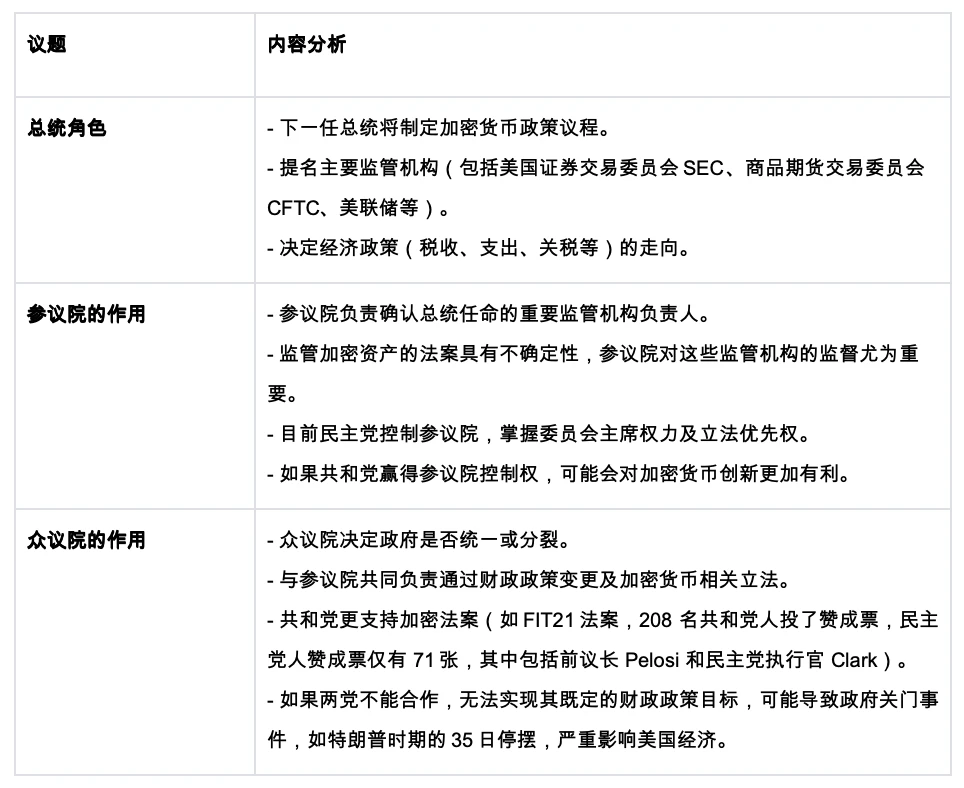
As of October 25, Polymarket data shows that different parties have different probabilities of winning the presidential, Senate and House elections. Among them, the only specific outcome with a high probability is that the Republicans control the Senate. At the same time, a "divided government" situation is also very likely to occur - this is when the president and the Senate are controlled by different parties. The last time a divided government occurred was during the Obama administration, and it did not occur during the Biden and Trump administrations.
This political situation usually leads to policy deadlock as the president and the Senate must compromise on major legislation and personnel nominations. If the Republicans win across the board, they are expected to pass new legislation in just three to six months, which will be a positive result for the cryptocurrency market as the Republicans tend to promote a looser regulatory framework for cryptocurrencies.
The U.S. Congress passed a temporary spending bill on Wednesday, September 25, to keep government agencies funded until December, temporarily avoiding a government shutdown. The passage of this bill also postponed final spending decisions until after the presidential election on November 5. In other words, the government's fiscal budget issues will be limited from December to the inauguration of the new Congress on January 3 of the following year. This means that during this transition period, the president's power may not have a broad impact on fiscal policy until the new House of Representatives takes office and a formal fiscal budget can be passed.
SEC leadership is likely to change
Since Gary Gensler became the chairman of the SEC, his tough regulatory policies have caused strong dissatisfaction in the cryptocurrency community. Although he has made some achievements in combating illegal securities issuance, his overly strict law enforcement approach has also been protested by many crypto companies.
Trump has publicly stated that if he is re-elected, he will "fire" Gensler and push the SEC to take a more friendly attitude towards cryptocurrency innovation. Traditionally, if the White House changes, the SEC chairman usually resigns, and it is not surprising that the Harris administration takes a similar stance to its opponent in an attempt to win the favor of the industry. Therefore, whether Harris or Trump wins, the leadership of the SEC may change significantly.
Macro liquidity: Fluctuations are inevitable, and the degree of QE is the determining factor
When the Federal Reserve cuts interest rates and global capital liquidity increases significantly, it is often a period when the price of Bitcoin (BTC) continues to rise, indicating that macro liquidity still has a decisive influence on the crypto market.
In 2020, the Trump administration launched an unlimited quantitative easing (QE) policy in response to the COVID-19 pandemic, injecting a large amount of funds into the crypto market. On March 15, 2020, the Federal Reserve lowered the target range of the federal funds rate by 1 percentage point to between 0% and 0.25%, and launched a quantitative easing program with a total amount of US$700 billion. Subsequently, the Federal Reserve further announced the cancellation of the QE limit, purchased assets according to "actual needs", and launched unlimited QE, which brought great liquidity to the crypto market.
On October 21, 2024, Trump reiterated at an event at Lancaster City Hall in Pennsylvania that he would significantly lower U.S. interest rates if he was re-elected president on November 5. This promise may once again drive up crypto assets such as Bitcoin, especially against the backdrop of further enhanced liquidity.
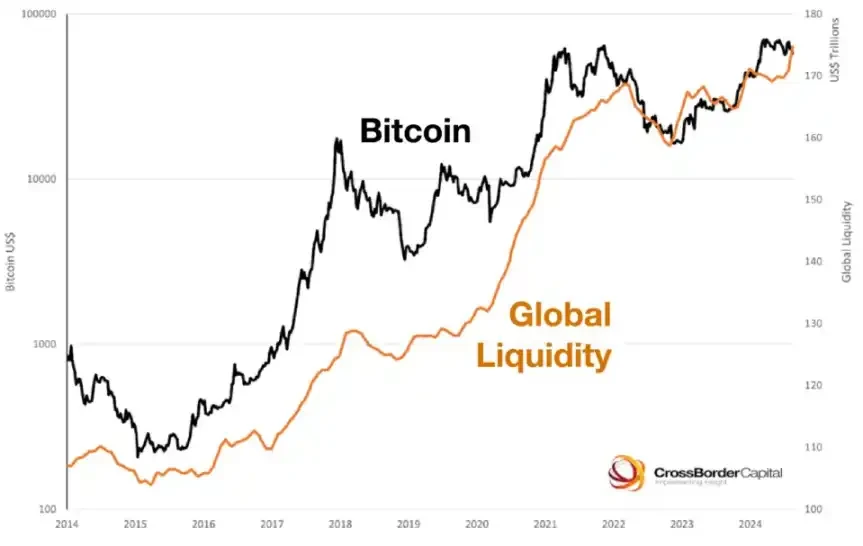
How the election affects crypto startups
Web3 prediction market achieves absolute superiority over Web2 competitors
Polymarket has quickly risen to become a leader in this field since its launch in 2020, accounting for 80% of the total betting volume in the US presidential election. It is rare for applications created by Polymarket in an on-chain environment to compete in existing markets and have the highest market share. Polymarket allows users to predict and bet on the outcomes of future events in multiple fields such as sports, politics, business, and science. The platform first gained significant attention during the 2021 US election, facilitating 91% of the total betting volume, worth $3.5 million.
Polymarket has gone through a number of challenges, including a $1.4 million civil penalty agreement with the U.S. Commodity Futures Trading Commission (CFTC), after which Polymarket no longer officially operates in the U.S., with U.S. users blocked from the site by geo-fencing. Still, CFTC Chairman Rostin Behnam warned that if they have a large enough “footprint” in the U.S., they should register their derivatives contracts or risk enforcement action.
Prediction markets are becoming a broader financial tool that goes beyond pure speculation. As Polymarket expands, their influence has expanded to areas such as public opinion, financial hedging, and business decision-making.
How prediction markets work
Prediction markets are derivative markets where participants place bets on the outcome of an event. These markets are usually binary options. For example, assuming this is a binary market, "whether to approve a Bitcoin spot ETF" can be decided by "yes" or "no". The price distribution of "yes" or "no" is determined by the predictions and bets of market participants, which add up to $1, or slightly more than $1.
On the expiration date when the outcome of the event is known, the value of the stock converges to either $0 or $1. The position of the participant who made a successful prediction becomes $1, and the position of the participant who made an incorrect prediction becomes $0, and this is how profits and losses are determined.
Outside of cryptocurrencies, offshore centralized providers often limit the amount of bets placed on specific outcomes, similar to sports betting. This limits individuals from fully leveraging their insights, and the final outcome is often controlled by centralized operators. On-chain prediction markets remove these barriers, with smart contracts and decentralized ledgers creating transparent global markets that ensure the platform is fair and cannot be cheated.

Polymarket's order book is a hybrid decentralized model. Orders submitted by users are sent to Polymarket's operators, who match and place orders off-chain. The underlying trading system is a customized trading contract that performs atomic swaps (settlement) between binary outcome tokens and collateral assets (ERC 20) based on signed limit orders.
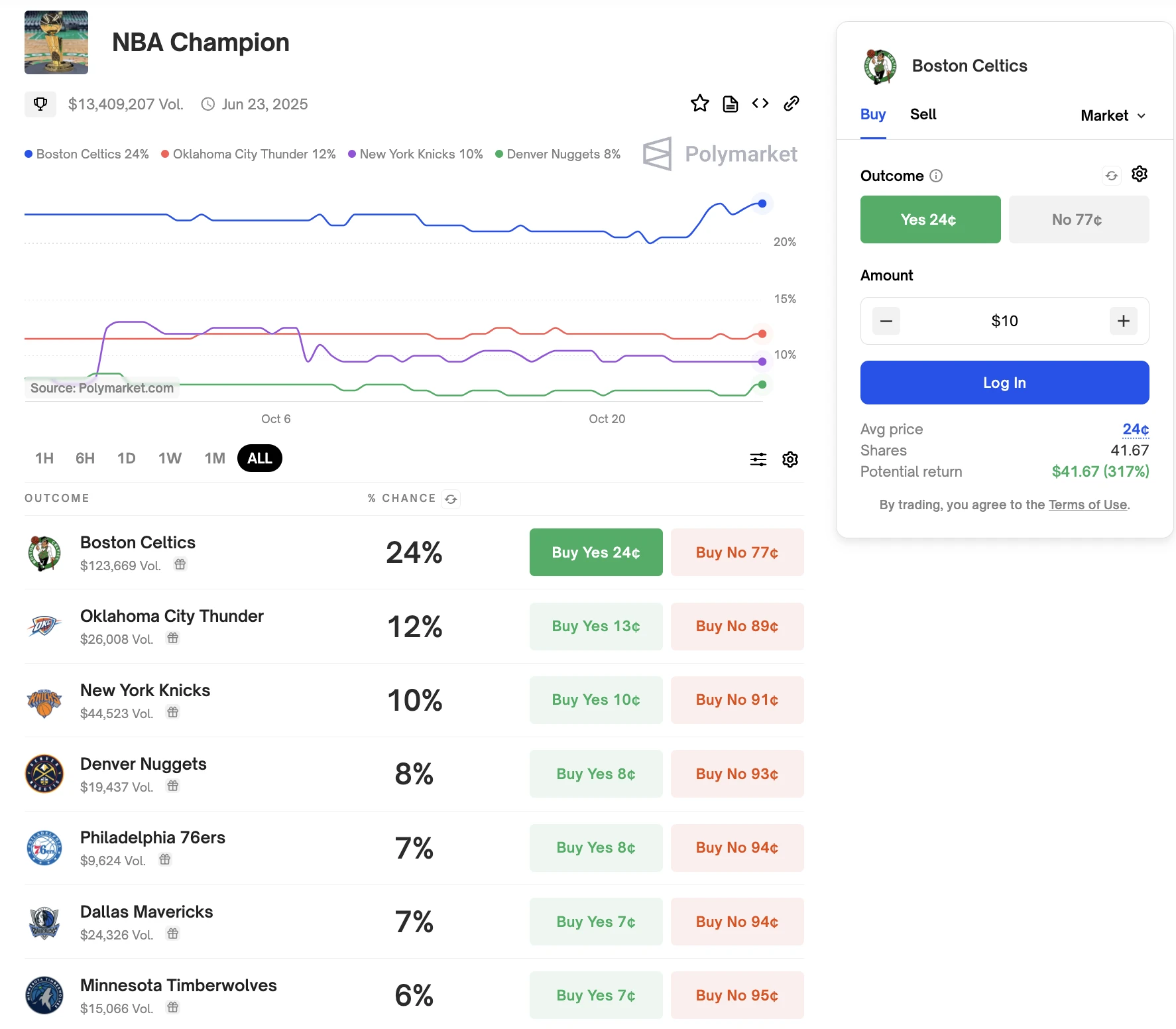
In addition to the binary markets shown in the example above, Polymarket also offers categorical and scalar markets. Categorical markets allow users to bet on multiple options, each of which will end up being worth $1 or $0, depending on the outcome. For example, a market predicting the 2025 NBA champion could include options such as the Celtics, Thunder, Knicks, Nuggets, etc. Since the regular season has just begun and everything is uncertain, users can choose to bet on multiple teams at the same time. Scalar markets work differently from the above two types of markets, with profit and settlement depending on where the final outcome falls within a predetermined range.
Product iteration in the prediction market
Augur is one of the earliest blockchain prediction markets, with a transaction volume of $400,000 in 2018, which is quite high considering the on-chain activity at the time, fully demonstrating the market demand for on-chain prediction markets, but due to complex mechanisms and malicious attacks, it failed to maintain a long-term user base.
Unlike Polymarket, in Augur, anyone can create a market by staking REP (Augur's governance token). According to Augur's mechanism, if there is an error in the components that make up the market (market definition, market expiration time, market decision conditions) when the market is created, the market will fail. Then the attacker can create a market with errors and use the mechanism to deliberately fail the market and make a profit. At the same time, Augur's permissionless creation of any market has also caused some very controversial events, such as the creation of a market for "when a certain singer will die."
In order to focus on attracting users during the initial process of building the application, Polymarket will centralize the creation of the market, provide a market that is easy for users to understand as much as possible, and plan a market strategy that is ethically uncontroversial and socially useful to ensure a stable initial user base. A small number of centralized strategies will be selected to ensure the smooth introduction of initial users, as long as transparency and traceability are ensured in the core transaction links.
Prediction market breaks out of the circle and enters mainstream society
According to the efficient market hypothesis, asset prices in the capital market quickly and completely reflect all information available to market participants. Based on this, the prediction market is always efficient, so it has the potential to solve incorrect predictions, that is, market inefficiency, and achieve accurate predictions.
The founder of Polymarket pointed out that Polymarket was launched in response to widespread errors and misinformation during the pandemic. In fact, Polymarket has now realized the significance of transforming the speculative demand of market participants into a tool for collecting public opinion. It captured the prediction that Kamala Harris was likely to be nominated as the Democratic candidate and J.D. Vance would be selected as Trump's vice presidential candidate before the official announcement. It has been widely adopted by multiple mainstream media (even including mainstream media in mainland China that are unfriendly to crypto) as an alternative source of news. The widely purchased and used Bloomberg trading terminal even began to add Polymarket data to its panel in August 2024.
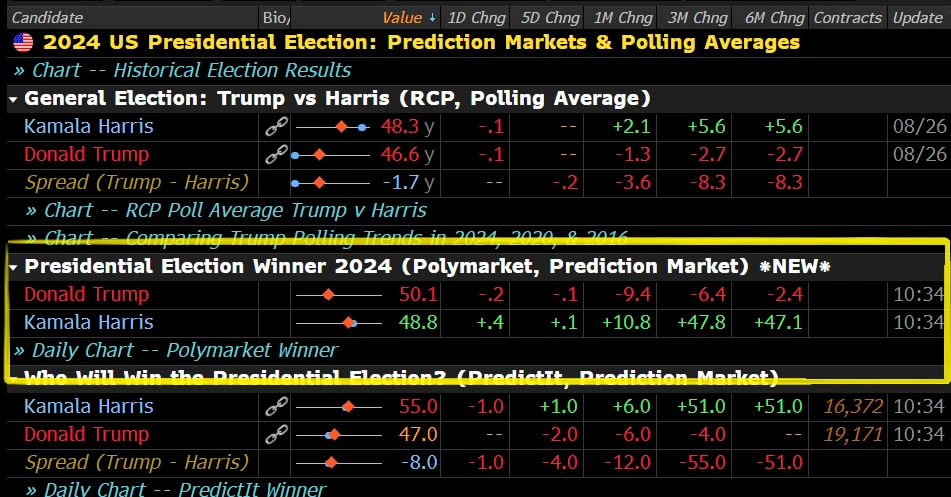
Polymarket is also integrating with content platforms. On July 30, Substack, a well-known content subscription payment platform, announced the launch of the prediction market embedding function from Polymarket, marking the launch of its new Substack THE ORACLE by Polymarket. In The Oracle, readers will find insights and analysis from thousands of active markets on the Polymarket trading platform. Polymarket's The Oracle will regularly summarize some noteworthy markets and their key statistics, and conduct in-depth analysis of some of the hottest issues at the moment.
Predicting the future direction of the market
Currently, Backpack Exchange has launched a prediction token for the US election, SynFutures and dYdX have launched leveraged trading related to the US election, and introduced advanced order functions (such as limit orders and stop-loss orders) to help users manage risks. This leveraged trading allows users to leverage larger positions with smaller initial funds and amplify potential profits. dYdX is more focused on Trump's perpetual prediction trading, allowing traders to participate in the market through long or short positions and use up to 20 times leverage. This flexible trading structure allows users to take advantage of every fluctuation in the market and even obtain high returns in the short term.
In general, the combination of leverage trading and prediction market is currently more complicated for ordinary users to understand and operate, and is more suitable for professional traders.
Trump's victory means an incentive for cryptocurrency companies to be incubated and listed in the United States
Under the leadership of the Trump administration, there will be a clearer regulatory framework and a relaxed regulatory environment, which will greatly change the current situation where a large number of crypto companies flee the United States and block US IP. At the same time, according to Bloomberg, many crypto-related companies such as Circle Internet Financial, Kraken, Fireblocks, Chainalysis and eToro may go public in the next one or two years, and some other crypto companies that meet the requirements are also expected to go through the normal listing process.
Looking back at Biden's administration, the tough regulatory attitude of current SEC Chairman Gary Gensler has led to a scarcity of cryptocurrency IPOs in recent years, which has directly made it more difficult for crypto companies to obtain financing from mainstream traditional funds. You must know that the huge wealth effect of Coinbase's listing in 2021 attracted a large number of traditional funds to open crypto departments. However, in the 2024 Forbes MidasList, the only crypto project is still Coinbase.
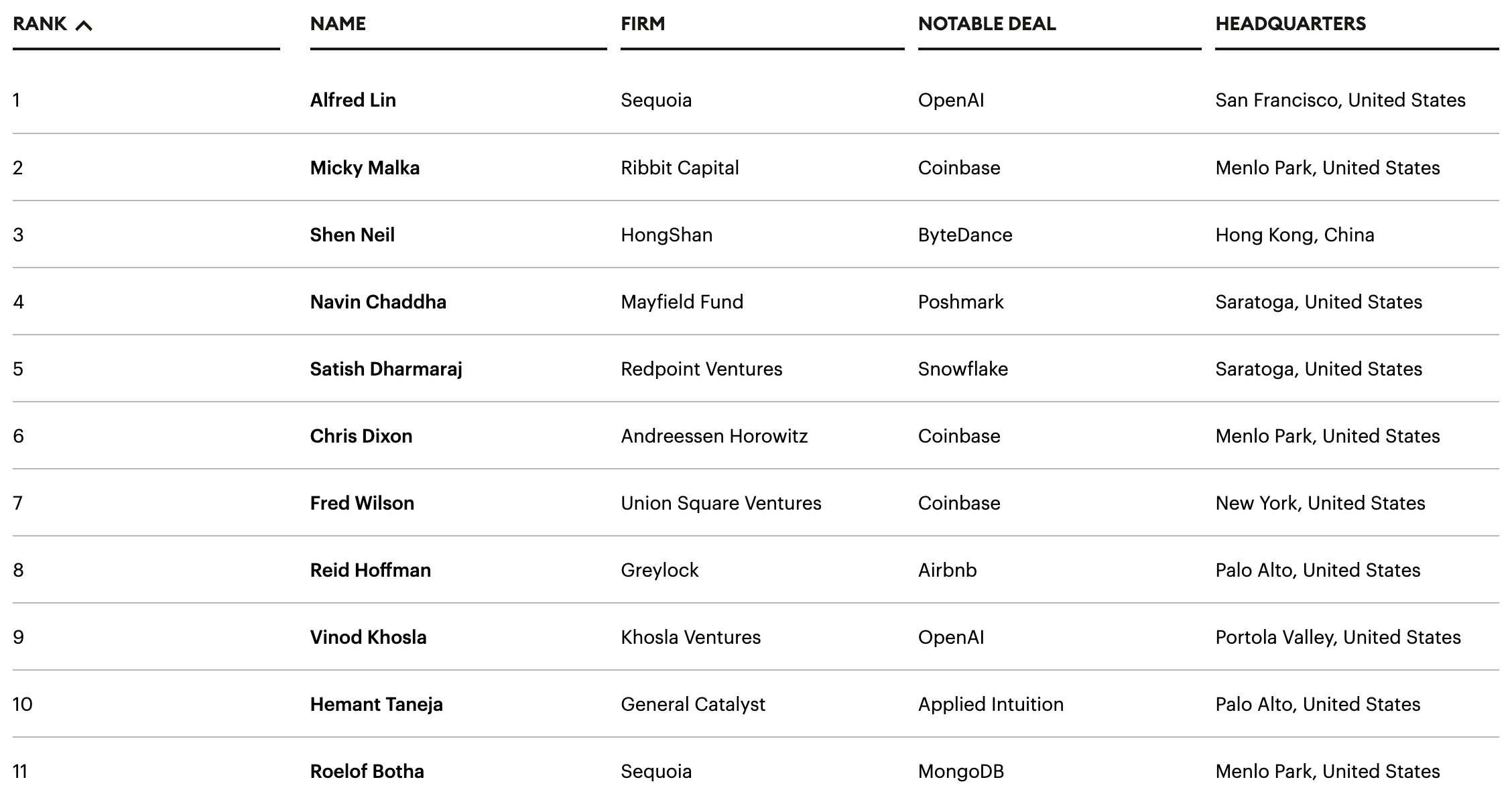
DeFi and BTCFi will benefit first
Although Trump's own DeFi project World Liberty Financial's token WLFI only sold 4.3% and was accused of lacking practicality, it still showed his interest in the field of decentralized finance (DeFi).
In DeFi, BTCFi is easier to build consensus, gain legitimacy, has a more solid foundation, and its development is certain.
BTC is currently the largest consensus common denominator between the crypto industry, Wall Street and the SEC. The core of BTCFi is to leverage BTC - businesses such as staking, lending, trading and derivatives are all different forms of leverage. Over time, BTCFi will show a growth trend that multiplies the value of BTC itself, similar to the performance of other major asset classes. However, this development requires a long period of good external environment. If Trump wins in future elections, this process may be accelerated.
Crypto companies that develop BTC financial instruments can be encouraged and receive a more relaxed regulatory environment, consolidating their position as a base asset. On the other hand, BTCFi's innovation will be led by developers, promoting a series of breakthrough applications based on Bitcoin programmability, such as the 2025 Bitcoin upgrade, which is expected to pass OP_CAT as another upgrade since the taproot upgrade in 2021. As long as OP_CAT can pass, developers can use Bitcoin native high-level programming languages such as sCrypt to achieve decentralized and transparent smart contract development on the Bitcoin mainnet. sCrypt is a TypeScript framework for writing smart contracts on Bitcoin, which allows developers to write smart contracts directly in TypeScript, one of the most popular high-level programming languages. The current Bitcoin layer 2 can also be converted to zk rollup, and the total scale of BTCFi is expected to be more than ten times the current BTC market value.

Currently, many projects are discussing the use of sCrypt for development around OP_CAT. For example, Fractal Bitcoin, as a Bitcoin parachain, already supports OP_CAT and has launched the CAT protocol. The re-staking project Babylon and the stablecoin lending project Shell Finance, which are currently developed using the Bitcoin scripting language, have the idea of conducting related development after OP_CAT is launched to achieve complete decentralization and more complex on-chain functions, relying on the Bitcoin consensus to fully guarantee security.
References:
1. https://a16z crypto.com/posts/podcast/state-of-crypto-stablecoins-ai-us-election-builder-energy/
2. https://foresightnews.pro/article/detail/65606
3.https://www.panewslab.com/zh/articledetails/0ygov3 7 p 347 p.html
4. https://foresightnews.pro/article/detail/62075
5.https://foresightnews.pro/article/detail/69666
6.https://foresightnews.pro/article/detail/67050
7.https://mp.weixin.qq.com/s/ZlIR88qAd8HkYP9YpAc8iA
8.https://foresightnews.pro/article/detail/68230
9.https://mp.weixin.qq.com/s/4NEOiYHyJPmlaQ4 zHyZ 3 iA















